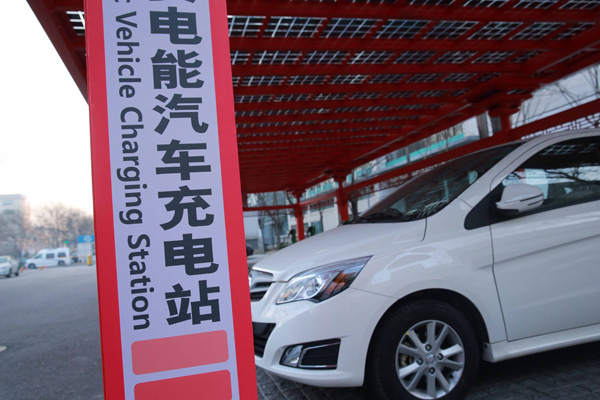

A solar-powered charging station for new energy vehicles, the first in Beijing, opened to the public in January. It takes about a half-hour to recharge a car. (Photo: Chen Ming/for China Daily)
Capital is promoting use of new energy vehicles to curb pollution
The number of new energy vehicles in Beijing is expected to increase as favorable policies are put into place, such as free parking and discounted tolls, to encourage green transportation and reduce air pollution.
However insufficient charging facilities could slow the trend, requiring the government to build more facilities to meet the increasing demand, some lawmakers and political advisers have suggested.
Economic reform and traffic authorities in the capital will conduct joint studies and release detailed plans on free parking for new energy vehicles by the end of March, according to a municipal report, which listed 84 major measures in 2015 to improve the air quality, under the city's five-year (2013-17) clean-air action plan.
The 2015 work plan also said various city government departments will consider the feasibility of lowering expressway tolls for new energy vehicles - details are also expected to be released by the end of March.
Some media have reported that Beijing will not restrict the use of new energy vehicles - unlike gas-or diesel powered vehicles - when the city is shrouded with smog.
Beijing Executive Vice-Mayor Li Shixiang confirmed on Monday that the city is looking into lower tolls and free parking for new energy vehicles.
"The government will design the policies based on the existing laws and regulations and will issue them after thoroughly studying the issues," Li said.
He added that Beijing will continue to encourage the use of new energy vehicles through subsidies and policies.
The capital will give buyers of fuel cell electric vehicles 54,000 yuan ($8,630) subsidies - subsidies that will be matched by the central government - in 2015, according to the Beijing Bureau of Finance.
"In addition, we will make more license plates available for new energy vehicles, as well as encourage drivers to purchase these green vehicles," said Zhou Zhengyu, head of the Beijing Committee of Transportation.
The annual quota for additional new energy vehicle license plates was increased to 30,000 last year and will grow to 60,000 annually in next two years, he said. But the annual quota for all vehicles - including the new-energy and gasoline, diesel - will stay at 150,000 for three years starting this year.
The city government has promoted green vehicles for a wider range of purposes in 2014. For example, at least 1,000 electric taxies were on road by the end of 2014. And some electric vehicles will be available for temporary rental, like public bicycles.
New energy vehicle stimulus measures are part of the capital's efforts to reduce recurrent smog, which has turned attention to vehicle exhaust as a major pollutant.
Since 2014, there have been more than 5.6 million vehicles on the road in Beijing, contributing 31.1 percent of the airborne pollutants and making vehicles the city's largest single source of pollution, according to the report from the municipal environmental watchdog.
Traffic authorities will maintain strict measures to keep the number of diesel vehicles from increasing and will encourage the use of new energy vehicles, said Beijing Traffic Committee Director Zhou Zhengyu in the bureau's 2015 work report.
However, the success of promoting new energy vehicles also depends on the supporting facilities - the charging poles and stations - an opinion shared by officials, transport researchers and new energy vehicle users, and also a hot topic at the two sessions.
Beijing has installed more than 6,600 charging poles since 2009, and 1,500 of them are open to public use. More charging poles are being installed so that there will be a pole in every 5-km radius by the end of 2015, according to Beijing Commission of Development and Reform, the municipal economic planner.
But that is far from enough to satisfy the needs of residential communities, said Xu Heyi, chairman of the Beijing automaker BAIC Group.
Li Shufu, chairman of Zhejiang Geely Holding Group, agreed with Xu and added that the government must install more charging poles that can serves different new energy vehicle brands.
"The governments need to strictly rein in exhaust from diesel vehicles, or the growth in new energy vehicles may be unable to meet the expectation of curbing air pollution," Li said.
Copyright ©1999-2018
Chinanews.com. All rights reserved.
Reproduction in whole or in part without permission is prohibited.